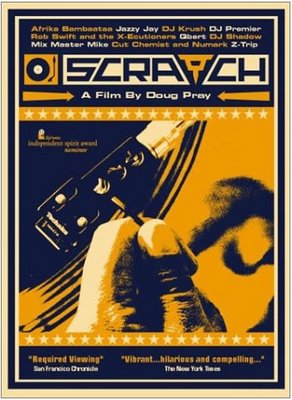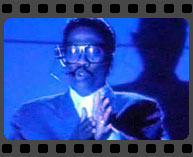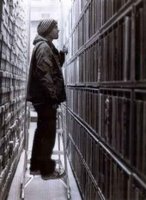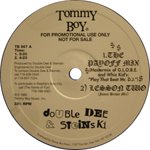Scratch: “Here is a story that must be told”
 The exciting thing about exploring different kinds of music beyond your own personal niche is that you sometimes find common threads in the most unexpected places. Take the fantastic 2001 documentary Scratch from writer/director Doug Pray, which traces the musical and cultural evolution of turntablism & record-scratching from its ’70s roots in New York, through the ’80s craze and early ’90s, into the state of the genre at the start of this century and beyond.
The exciting thing about exploring different kinds of music beyond your own personal niche is that you sometimes find common threads in the most unexpected places. Take the fantastic 2001 documentary Scratch from writer/director Doug Pray, which traces the musical and cultural evolution of turntablism & record-scratching from its ’70s roots in New York, through the ’80s craze and early ’90s, into the state of the genre at the start of this century and beyond.
As a music lover, I found it be a fascinating look at a world that I didn’t know much about, but one that traces common elements of the creation of music, the passion behind a new sound, the fury to create something fresh. It is a vastly entertaining 84 minutes that flies by to a consistently thumping background of interesting beats, with appearances by many of the major players in this scene from its inception to today (DJ Shadow, Cut Chemist, Mix Master Mike, Z-Trip and more). Filmed mostly in hallowed haunts of the hip-hop scene in New York and San Francisco, I also was tickled to see several places I know from California – from freeways and suburbs to Amoeba Records and The Fillmore. Visually, the variety of filming locations were interesting and authentic.
 Throughout the film, the most-mentioned “revelation moment” in the interviews was the 1983 Grammy-nominated hit “Rockit” by Herbie Hancock. This was the first time that the sound of the scratch had made it into a song that was a commercial hit, and many were electrified in listening to that scratch for the first time. Mix Master Mike (of the Beastie Boys and solo DJ) recalls a sentiment oft-repeated throughout the film: “What is that zig-a-zig sound? I knew I wanted to do THAT.” Scratch captures some of the early passion and the fire that spread when this music was first created and played, and I related to the feelings of urgency in hearing a new sound.
Throughout the film, the most-mentioned “revelation moment” in the interviews was the 1983 Grammy-nominated hit “Rockit” by Herbie Hancock. This was the first time that the sound of the scratch had made it into a song that was a commercial hit, and many were electrified in listening to that scratch for the first time. Mix Master Mike (of the Beastie Boys and solo DJ) recalls a sentiment oft-repeated throughout the film: “What is that zig-a-zig sound? I knew I wanted to do THAT.” Scratch captures some of the early passion and the fire that spread when this music was first created and played, and I related to the feelings of urgency in hearing a new sound.
Self-confessed record junkie/NY ad exec/DJ Steve Stein (aka Steinski) says he remembers thinking when he first heard these sounds: “There is nothing in this music that I don’t want to hear. This is music that I’ve been waiting all my life to hear . . . and I didn’t know it.” That’s a quote that could just as easily be applied to the birth of the rock ‘n’ roll sound, but here the same sentiment is cropping up 20-30 years later in the birth of turntablism and hip hop culture.
One thing that resonated with me was the assertion that scratching together records is just another way of making music: a turntable instead of a drum kit, different samples and breaks instead of guitar riffs and bridges. I had never thought of that before, and it is a fascinating concept. In the film DJ Swift explains, “The turntable is a musical instrument as long as you could see it being a musical instrument. You’re dealin’ with notes, you’re dealin’ with measures, you’re dealin’ with timing, you’re dealin’ with rhythm — It’s just, you know, different tools but the outcome is the same: music.”
I also recognized some of the same fiercely independent spirit in the production of this new sound, one that could just as easily be applied to garage rock bands of my youth. Producer Billy Jam from Hip Hop Slam Records said of the early days, “If you’re doing something and no one even gives a fuck about what you’re doing, and you’re just doing it in your bedroom for yourself, it’s like how you really feel, it’s like a painter goin’ crazy — That’s what happened and that’s why they would come up with this. It wasn’t like ‘Will this work at the club Saturday night.’ It was ‘Well, what sounds good to me and these people in the room with me?'”
 My favorite segment of this documentary (that I completely related to & loved & appreciated) was entitled “digging.” The filmmakers followed DJ Shadow, Z-Trip and others as they go on the hunt through hundreds and hundreds of stacks of old vinyl, looking for that perfect beat, that hook, that break to insert into their mix to make it truly unique. DJ Shadow takes us to his favorite record store in Davis, California that has a basement filled to the rafters with old, forgotten pressings. He says, “This is just — it’s my little nirvana.”
My favorite segment of this documentary (that I completely related to & loved & appreciated) was entitled “digging.” The filmmakers followed DJ Shadow, Z-Trip and others as they go on the hunt through hundreds and hundreds of stacks of old vinyl, looking for that perfect beat, that hook, that break to insert into their mix to make it truly unique. DJ Shadow takes us to his favorite record store in Davis, California that has a basement filled to the rafters with old, forgotten pressings. He says, “This is just — it’s my little nirvana.”
After years of trolling the regular stacks and hearing references to “let me go check the basement” from the owners, Shadow finally got the guts to ask to see the basement himself, and has been coming back several times a month ever since. He says, “It’s an incredible archive of music culture. I couldn’t believe that there was still something like this, a cache this large. And it’s largely untouched.” Musical archaeology, baby.
This film also talked about the element of fun & surprise in scratching. Each artist wants to find something awesome that they can use, dropped into the middle of a mix, to just blow their audience out of the water. There was a passionate and enthusiastic story in the film, about the early days of seeing this music performed in a live setting. Zulu Nation grandfather/musician/cryptic dude Afrika Bambaataa apparently has a reknowned ability to uncover the perfect deep cuts to add to a mix: One night at a club in NYC, he handed the DJ a record and told him to play cut 2 – “The Clapping Song” by Shirley Ellis. “And everyone went crazy,” the story says. The perfect sound at the perfect time.
 Since I was a wee child in 1983, I had never heard the backstory behind the famed Lessons, which were produced in ’83-’85 by Double Dee & Steinski — the first records made entirely from other records. Their innovative purpose was to be fodder for the turntables, a collection of sounds to scratch into others. Watch for the entertaining segment (and mindblowing to Steinski himself, who says “it was never intended to be done live!”) where DJ Shadow and Cut Chemist recreate the Lessons in a live setting.
Since I was a wee child in 1983, I had never heard the backstory behind the famed Lessons, which were produced in ’83-’85 by Double Dee & Steinski — the first records made entirely from other records. Their innovative purpose was to be fodder for the turntables, a collection of sounds to scratch into others. Watch for the entertaining segment (and mindblowing to Steinski himself, who says “it was never intended to be done live!”) where DJ Shadow and Cut Chemist recreate the Lessons in a live setting.
Look, just this month the kids have all gone a bit nuts over the supremely enjoyable, ADD-inflicting sounds of the mile-a-minute mashups of Girl Talk, showing the debt that modern music owes to these guys who pioneered a fresh sound — even though their parents said “For God’s sake, be careful with that turntable needle. And don’t scratch up our records!”
Rockit – Herbie Hancock
The Clapping Song – Shirley Ellis
Lesson One (The Payoff Mix) – Double Dee and Steinski
Lesson Two (The James Brown Mix) – Double Dee and Steinski
Lesson Three (The History of Hip Hop) – Double Dee and Steinski



 Name: Heather Browne
Name: Heather Browne